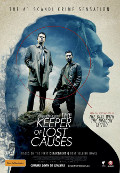
Directed by
Mikkel Norgaard
93 minutes
Rated MA
Reviewed by
Chris Thompson

The Keeper Of Lost Causes
Synopsis: After ignoring protocol in a routine arrest, police inspector Carl Mørck (Nikolaj lie Kaas) gets one partner killed and the other paralysed. As punishment he’s relegated to the new Department Q where he and his assistant, Assad (Fares Fares) are in charge of the past twenty years’ worth of cold cases. Despite being ordered to limit himself to reading and clearing the files, Mørck becomes intrigued by the case of politician Merete Lynggaard (Sonja Richter) who disappeared from a ferry five years earlier and was classified as a suicide. With the only witness being her intellectually-disabled brother Uffe (Mikkel Boe Følsgaard,) Mørck drags Assad into an unsanctioned investigation to find out the truth about Lynggaard’s disappearance.
Sometimes it seems like so-called Nordic Noir is taking over our screens. On the small screen we’ve had three seasons of The Killing and two seasons of The Bridge and Borgen (plus their various US and UK remakes) and in the cinema we’ve seen The Girl With The Dragon Tattoo and its follow-ups and remakes. Now comes The Keeper of Lost Causes, the first film adaptation of Jussi Adler-Olsen’s bestselling Department Q crime novels (a second film adaption with the same cast, screenwriter and director is already in production).
The film comes with an impressive pedigree. Screenwriter, Nikolaj Arcel wrote The Girl With The Dragon Tattoo and Mikkel Norgaard directed four episodes of Borgen. It’s perhaps surprising, then, that this film seems much more run-of-the-mill than other works in the genre. Yes, it explores some dark themes and its characters are interesting and complex, but it all feels very familiar in terms of the ideas it explores. It has a well motivated villain who employs a suitably elaborate methodology - maybe not as elaborate as an exsanguinated body cut in half on a bridge that borders two countries, but still quite imaginative and gruesome. It’s visually moody and brooding, much like its lead character, Carl Mørck who, true to form for this kind of story, flies in the face of rules and directives, antagonising his boss and his colleagues in the pursuit of a truth that only he seems certain is out there. It’s a strong performance, counterpointed by the warmth of Fares as Assad.
What’s most interesting about this film, though, is its style of story-telling. The procedural aspects of the investigation are juxtaposed against glimpses of what really happened so that we are sometimes ahead of the investigation and other times right there with it, and, as these two timelines progress, they draw closer and closer to each other until they inevitably intersect. When key breakthroughs in the case occur, we are provided with the back-story we now need in a clever, rapid fire montage style that quickly brings us up to speed with the information that the investigation has uncovered.
Yet, still, it feels like something’s missing. Maybe after getting used to Scandinavian stories offering us such complex and challenging female characters as The Bridge’s Saga Norén and Dragon Tattoo’s Lisbeth Salander, it’s the absence of a truly unique character like these, be it male or female, that niggles. A story about two mismatched cops flouting the rules in order to save the girl seems somewhat less impressive than this film’s predecessors. Despite that, though, The Keeper Of Lost Causes is a satisfying thriller - more intriguing than nail-biting – but enjoyable nonetheless.

Want more about this film?


Want something different?




